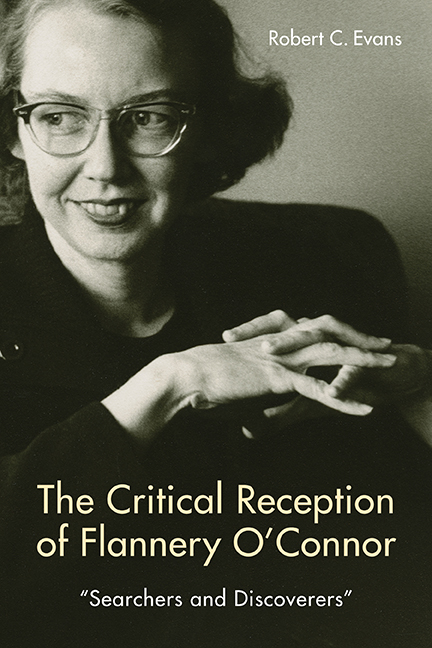Book contents
- Frontmatter
- Dedication
- Epigraph
- Contents
- Acknowledgments
- Introduction
- 1 Aesthetics: Style, Form, Themes, and Characterization
- 2 Religion: Christianity and Catholicism
- 3 History and Historical Contexts
- 4 The South: Heritage and Change
- 5 Race: Blacks and Whites
- 6 Gender: Women and Men
- Conclusion: O'Connor Criticism: What Now? What Next?
- Works Cited
- Index
2 - Religion: Christianity and Catholicism
Published online by Cambridge University Press: 15 August 2018
- Frontmatter
- Dedication
- Epigraph
- Contents
- Acknowledgments
- Introduction
- 1 Aesthetics: Style, Form, Themes, and Characterization
- 2 Religion: Christianity and Catholicism
- 3 History and Historical Contexts
- 4 The South: Heritage and Change
- 5 Race: Blacks and Whites
- 6 Gender: Women and Men
- Conclusion: O'Connor Criticism: What Now? What Next?
- Works Cited
- Index
Summary
FLANNERY O'CONNOR always insisted that she was first and foremost a Christian in general and a Catholic in particular. She admired fundamentalist Protestants because she believed they had worked their way independently toward a kind of Christianity quite close to orthodox Catholicism: they were almost Catholics but were just outside the Catholic Church. She saw their alleged religious shortcomings but admired their profound commitment to Christ—a commitment she shared. It has been argued that O'Connor's works cannot be fully understood except as Christian writings. To say this, however, is not to say that O'Connor wrote pious propaganda. She despised sentimental Christian writers and writings. She also disdained Christian works that were too clearly designed to win souls. Instead, she wanted her own Christian fiction to be tough-minded and honest. It should face sin's grim realities and mock human pride. It should suggest—not preach—Christ as the only answer in a fallen, corrupt world. Some commentators have endorsed her own Christian view of her works. Others have suggested that this view fails to do full justice to the works themselves. Some critics find her theology unappealing; others argue that her writings are well worth reading even if one rejects her Christian premises.
Issac Rosenfeld, reviewing Wise Blood in 1952, was one of the first critics to find O'Connor's religious emphasis unappealing, or at least inept. “There is,” Rosenfeld wrote, “an unfortunate tendency among religious writers to take everything as grist for the mill; and this is particularly unfortunate when, as in Miss O'Connor's novel, the extremely important distinction between religious striving and mania is ground away” (19). Rosenfeld saw Hazel Motes not as a sympathetic religious quester but as quite literally crazy:
Now I don't see how one can maintain that his madness lies in the effort to deny Christ, for he is wholly mad. Nor can one argue that this is what happens to all men, Protestants included, who deny Christ, for it certainly does not. How then can one take his predicament seriously? With pity, yes, sympathy, aversion, fear—all the emotions the insane call out apply in Motes’ case, but he is nothing more than the poor, sick, ugly, raving lunatic that he happens to be. If one takes him to be a valid representative of the religious mind, one might as well say openly that all religious people are crazy. (19)
- Type
- Chapter
- Information
- The Critical Reception of Flannery O'Connor, 1952–2017“Searchers and Discoverers”, pp. 114 - 148Publisher: Boydell & BrewerPrint publication year: 2018

